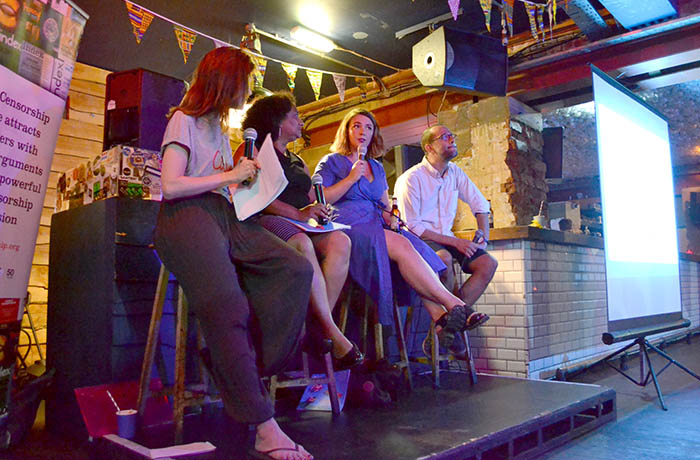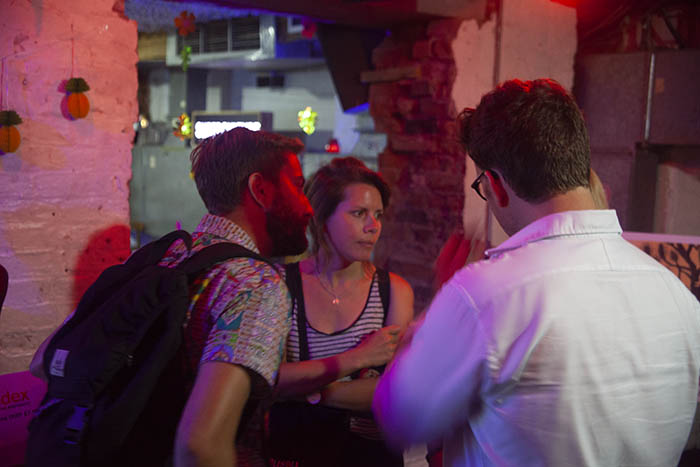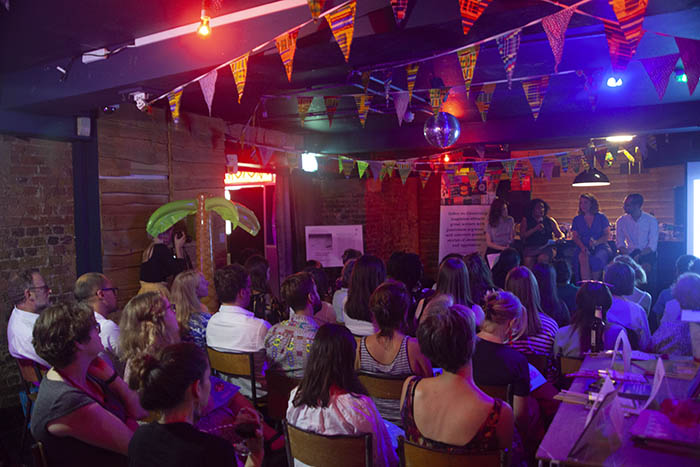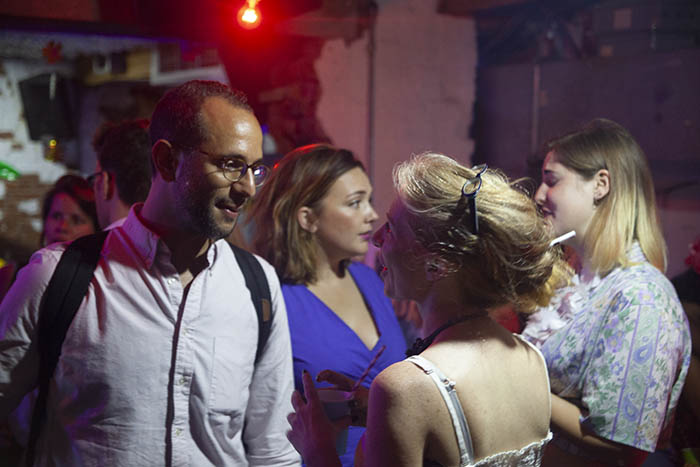4 Sep 2018 | Academic Freedom, News and features, Turkey, Turkey Uncensored
Hanifi Barış, an outspoken Kurdish academic and lawyer, has been imprisoned by Turkish authorities since 4 July 2018. His detention for sharing press articles on social media is another demonstration of the repeated attacks against freedom of expression and critical opinions in Turkey.
Hanifi Barış obtained his Ph.D from the Centre for Citizenship, Civil Society and Rule of Law at the University of Aberdeen in 2017. Interested in political theory and human rights, he has published several articles and book chapters on Kurdish politics. After completing his dissertation, Barış moved back to Turkey and settled in Istanbul, where he started working as a lawyer. In his roles as an academic and a lawyer, Barış stood out as an ardent defender of human rights. In 2012, he drew public attention for representing a famous conscientious objector and defending his client’s rights to answer to the court in Kurdish. In January 2016, he was one of the Academics for Peace who signed the petition “We will not be a party to this crime”, which denounced the state-sanctioned violence in the Kurdish regions and called on the Turkish government to re-establish peace negotiations.
On 3 July, Barış received a call from Istanbul Bakırköy Police station, asking him to give a statement about his social media posts. The next day, after giving his statement to the police, he was referred to the court, where the prosecutor requested his arrest. He was accused of producing “terrorist propaganda” on the ground of article 7/2 of the Anti-Terror Law no 3713. Barış had shared news articles and commentaries from international and local media on his Facebook and Twitter accounts. It is worth emphasising that he did not add any of his own commentary on the posts. At the court’s request Barış was sent to prison on the same day. Since then, the appeals of his lawyer, Mehmet Doğan, for his release pending trial have been repeatedly denied. Even worse, when Barış asked to be moved to another dormitory in Silivri Prison, he was sent to an individual cell and remained in solitary confinement for 12 days.
On 23 July 2018, İstanbul’s 29th High Criminal Court accepted the indictment against Barış and re-affirmed his pre-trial detention. The Court based its decision on an ongoing assessment of digital materials that had been supposedly confiscated during an alleged search of his residence and belongings. However, no such search ever took place. This blatant disregard for the rule of law and due process casts serious doubts on Barış’s prospect for a fair trial, highlighting Turkey’s systematic use of pre-trial detention as a means of intimidation.
The news and commentaries shared by Barış on social media were critical of the Turkish government and its policies in Syria. They included articles from websites such as The Guardian and Foreign Policy. It is absurd to construe those articles as “terrorist propaganda” under article 7/2 of the Anti-Terror Law, which criminalises statements “justifying or praising or inciting the terrorist organizations’ methods which contain violence, force or threat”. Rather, Barış’s indictment reflects the Turkish government’s criminalisation of free speech and attempt to silence all critical opinions. Just as the repression of critical newspapers and media has been on the rise in recent years, arrests on the ground of social media posts have witnessed a dramatic increase. While the crackdown has particularly targeted Kurdish politicians and activists, journalists, students, lawyers and academics, arbitrary arrests of social media users serve as a warning to all who voice their dissent against the current Turkish regime.
Since early July, Academics for Peace, Barış’s colleagues from the University of Aberdeen and human rights organisations have strongly protested against his detention. An ongoing petition asking for his immediate release has received almost 5,000 signatures. Many of those who signed are internationally-renowned academics. At the University of Aberdeen, which has actively sought to mobilise support since Barış’s arrest, one of his colleagues describes him as “a clear-headed scholar, who draws on his experience as a practising lawyer to make original contributions to thinking on political community and direct or semi-direct democracy”. Barış, he says, is “the kind of scholar who could find common ground with academics from almost any perspective: always good-natured, cheerful and unfailingly kind to everyone he interacted with.”
Barış’s first hearing is scheduled for Sep 18th. International observers are invited to monitor his hearing at Çağlayan Courthouse, with the hope that Barış will be immediately released and cleared of unfounded accusations.
2 Aug 2018 | Events
[vc_row][vc_column][vc_single_image image=”65502″ img_size=”full” add_caption=”yes”][vc_column_text]Is free speech a way to promote unheard and under-represented voices and perspectives, or is it a tool wielded by extremists and supremacists? Join activist, educator and filmmaker Toyin Agbetu, photographer and writer Courtney Hamilton, journalist Kiri Kankwhende, Buzzfeed News Editor Elizabeth Pears, activist and charity director Ethel Tambudzai, and filmmaker Dionne Walker as they present various positions in this lively discussion tackling taboos, censorship and some of the thorny, nuanced issues surrounding free speech, moderated by Kunle Olulode, director of Voice4Change. There will be a bar and the opportunity for all to join the discussion. Queensberry Rules apply![/vc_column_text][vc_column_text]In Partnership With[/vc_column_text][vc_row_inner][vc_column_inner width=”1/2″][vc_single_image image=”101939″ img_size=”full” onclick=”custom_link” link=”https://whatson.bfi.org.uk/Online/default.asp?BOparam::WScontent::loadArticle::permalink=freespeechpunchup&BOparam::WScontent::loadArticle::context_id=”][/vc_column_inner][vc_column_inner width=”1/2″][/vc_column_inner][/vc_row_inner][/vc_column][/vc_row][vc_row][vc_column][vc_column_text]
When: Thursday 06 September 2018 19:00
Where: Blue Room, BFI Southbank, Belvedere Road, South Bank London SE1 8XT (Directions)
Tickets: Free. Registration required via BFI
[/vc_column_text][/vc_column][/vc_row]
5 Jul 2018 | News and features, Volume 47.02 Summer 2018, Volume 47.02 Summer 2018 Extras
[vc_row][vc_column][vc_column_text]

Vicky Baker, Meera Selva, Harriet Fitch Little and Benji Lanyado. Credit: Rosie Gilbey
“I would always err towards saying go rather than don’t go,” said Benji Lanyado, travel writer and founder of picture agency Picfair, speaking at a panel debate to launch the summer 2018 issue of Index on Censorship magazine.
The latest issue of the magazine, Trouble in Paradise, looks at the free speech issues that are prominent in certain top travel destinations, and yet are often overlooked by tourists and the tourist industry. Countries covered included Mexico, Malta, the Philippines and the Maldives. For the launch, a panel of travel writers and editors shared their thoughts on the roles of writers to tell the full story, rather than the nice, PR holiday story, and discussed the free speech implications of travel.
Taking place at The Book Club in Shoreditch, London, Lanyado was joined by former foreign correspondent Meera Selva, and Harriet Fitch Little, a Financial Times writer. The discussion was chaired by Vicky Baker, a journalist at the BBC.

“The best travel writers do weave in the history and the politics of a place,” said Selva, while Fitch Little, talking about travel writing that might be paid for by travel companies or tourist boards as opposed to publications, said “there’s a way to write about a press trip that is fascinating and revealing.”
All panellists agreed on the value of speaking to locals in a destination, though they also acknowledged that doing so was not necessarily on the top of everyone’s holiday priority list, in particular families who might just want a nice break or might not have the budget for more adventurous travel – and that shouldn’t necessarily be condemned. “We all need escapism from time to time,” said Baker.
The panel also discussed whether travel journalists should write about problematic countries at all, raising questions about whether travelling to these places – and encouraging others to travel to them – benefits corrupt regimes.
“The best travel writers don’t just regurgitate the travel documents provided by the government,” Lanyado said.
“Sometimes you can get so obsessed by the pitfalls of a country and the leaders of a country that you forget about the people, and they can be totally different,” he added and asked whether boycotting a country was a form of censorship in its own right.

“If you don’t go, you don’t learn about the people,” said Baker.
Selva recalled a story of a travel journalist who went on a press trip to North Korea. While this journalist had first-hand experience of government propaganda, they also saw another side of the country when their bus driver did a detour into the countryside, heading off the beaten track. Had the travel journalist not gone, they would not have been able to report on this side.
The question of “ethical travel” was picked up by an audience member, Tina Urso from Malta, who spoke about Daphne Caruana Galizia, a Maltese journalist who was murdered on 16 October 2017 some 70 metres away from her home. Her death, which remains unsolved, exposed Malta’s dark side. There is now a memorial to Daphne opposite the central law courts in Valletta, the capital.
Urso said how this memorial is constantly dismantled, but that tourists, more so than locals, regularly rebuild it. She therefore saw the presence of tourists in Malta as playing a fundamental – and positive – role in highlighting these free speech abuses.
Finally, Fitch Little, who worked for local press in Lebanon and Cambodia, noted that there can sometimes be pressure coming from the other direction, namely pressure for writers to ham up the darker sides of destinations and that this too can conceal the real truth. She said how when writing about Cambodia, UK media often wanted a particular angle, usually one related to the Khmer Rouge.
Equally, when working for Time Out in Lebanon, her friends back home found it hard to believe that the country could have nice restaurants, for example, having seen the country in a more negative light. “Less sexy stories don’t get told,” she said.

For more information on the summer issue of the magazine, click here. Included in the issue is an article from a Maltese journalist, Caroline Muscat, on corruption in the country, a look at journalists living under protection due to their reporting of the drug wars in Baja California Sur and an interview with Federica Angeli, a journalist who lives under 24-hour police protection following her exposé of the mafia in the pretty Italian seaside resort of Ostia.
[/vc_column_text][/vc_column][/vc_row][vc_row][vc_column width=”1/3″][vc_custom_heading text=”Trouble in Paradise”][vc_column_text]The summer 2018 issue of Index on Censorship magazine takes you on holiday, just a different kind of holiday. From Malta to the Maldives, we explore how freedom of expression is under attack in dream destinations around the world.
With: Martin Rowson, Jon Savage, Jonathan Tel [/vc_column_text][/vc_column][vc_column width=”1/3″][vc_single_image image=”100843″ img_size=”medium”][/vc_column][vc_column width=”1/3″][vc_custom_heading text=”Subscribe”][vc_column_text]In print, online. In your mailbox, on your iPad.
Subscription options from £18 or just £1.49 in the App Store for a digital issue.
Every subscriber helps support Index on Censorship’s projects around the world.
 SUBSCRIBE NOW[/vc_column_text][/vc_column][/vc_row]
SUBSCRIBE NOW[/vc_column_text][/vc_column][/vc_row]
14 Jun 2018 | Events
[vc_row][vc_column][vc_column_text]
What is hate speech? What is behind the rise of hate-speech legislation and codes? Are some words and ideas just too hateful for public life? Is policing hate speech the best way to protect equality and freedom — or is free speech, more speech, the answer?
Join Index on Censorship, LSE Law, LSE Human Rights and spiked for this free panel, Q&A and book signing, to mark the publication of Nadine Strossen’s new book.
[/vc_column_text][/vc_column][/vc_row][vc_row][vc_column][vc_custom_heading text=”Speakers” font_container=”tag:h3|text_align:left” use_theme_fonts=”yes”][vc_row_inner][vc_column_inner width=”1/4″][vc_single_image image=”100809″ img_size=”full” add_caption=”yes”][/vc_column_inner][vc_column_inner width=”1/4″][vc_single_image image=”100810″ img_size=”full” add_caption=”yes”][/vc_column_inner][vc_column_inner width=”1/4″][vc_single_image image=”100808″ img_size=”full” add_caption=”yes”][/vc_column_inner][vc_column_inner width=”1/4″][vc_single_image image=”100807″ img_size=”full” add_caption=”yes”][/vc_column_inner][/vc_row_inner][vc_column_text]
SPEAKERS:
Nadine Strossen is the author of numerous books. Her latest, HATE: Why We Should Resist it With Free Speech, Not Censorship, is out now. Nadine was the first woman national president of the American Civil Liberties Union (ACLU), serving from 1991 to 2008. She is professor of constitutional law at the New York Law School and is a frequent speaker on constitutional and civil-liberties issues.
Jodie Ginsberg is the head of UK-based freedom of expression organisation Index on Censorship. A former foreign correspondent and business journalist, Jodie worked for more than a decade for the Reuters news agency and was Reuters’ London Bureau chief. She has also worked as head of communications for Camfed, an international charity, and as an editor at Chime for Change. Follow her on Twitter: @jodieginsberg
Joanna Williams is an author, academic and the associate editor of the online magazine spiked. Her latest book is Women Versus Feminism: Why We All Need Liberating from the Gender Wars. Joanna taught in schools, and further and higher education, for over 20 years, most recently as director of the University of Kent’s Centre for the Study of Higher Education. She writes regularly for numerous other publications. Follow her on Twitter: @jowilliams293
CHAIR: Peter Ramsay is professor of law at LSE. His research interests include: the theoretical connections between criminal law, democracy and civil liberty; the protection of security interests by criminal law; the construction of the vulnerable legal subject. See more here.
This is a free panel and Q&A, which will be followed by a book signing with Nadine Strossen.
[/vc_column_text][/vc_column][/vc_row][vc_row][vc_column][vc_column_text]
When: Monday 2 July 2018, 18:30 – 20:00 BST
Where: London School of Economics, New Academic Building, Alumni theatre, Houghton Street, WC2A 2AE (Directions)
Tickets: Free. Registration required via Eventbrite.
[/vc_column_text][/vc_column][/vc_row]




